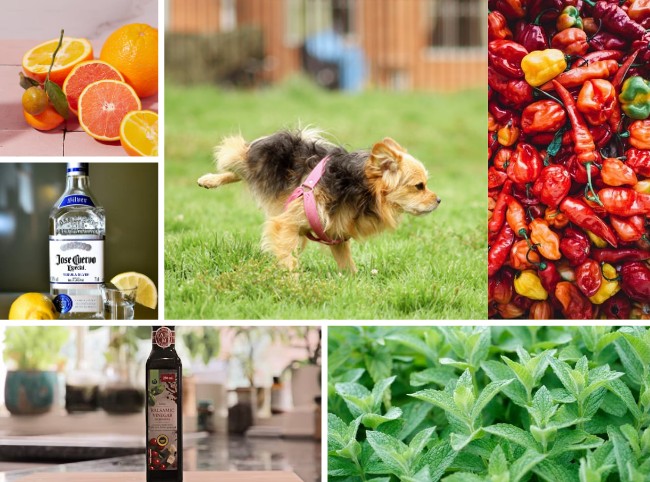When it comes to preventing dogs from peeing indoors or on lawns, understanding which scents they dislike can make your clean job easy. While no smell can completely stop a dog from peeing in a specific area, certain odors are known to repel dogs and can be used strategically to minimize unwanted urination.
Dogs use their sense of smell to understand the world. Scents can influence a dog’s behavior significantly. For example, certain smells can make a dog avoid an area. This is why some scents work as repellents.
This article lists the top 6 smells that dogs generally avoid when it comes to peeing.
Key Takeaways
- Citrus scents, particularly from lemons and oranges, are highly effective in repelling dogs and can be used in sprays or fresh peels to deter urination.
- Vinegar, with its strong acidic smell, is another scent disliked by dogs and can be applied in diluted form to discourage peeing in undesired areas.
- Spicy scents, including capsaicin from chili peppers, are potent but must be used cautiously to avoid harming the dog.
- Mint and peppermint are refreshing to humans yet repulsive to many dogs, making them good options for natural repellents.
- Ammonia and alcohol, while effective, pose significant risks and should be used carefully or avoided in favor of safer alternatives.
1. Citrus: A Potent Dog Repellent
Citrus scents, like those from lemons and oranges, are strong and can keep dogs away from areas you want to protect. Dogs generally dislike the smell of citrus. It’s fresh for humans but can be overwhelming for dogs. This is because it can irritate their sensitive noses.
How to use citrus to deter dogs
You can use citrus in several ways to keep dogs away (use citrus sparingly to avoid any potential harm to your pets):
- Cut up citrus fruits and place the pieces where you don’t want dogs.
- Fill a spray bottle with citrus juice and spray it around the area.
- Use oils from citrus peels in areas you want to protect.
Limitations of citrus as a repellent
While citrus is a natural and safe option, it has its downsides:
| Pros | Cons |
|---|---|
| Pleasant scent | Potential toxicity |
| Potent | Volatility of the oils |
Citrus can cause stomach upset and skin irritation in pets. It’s important to use it carefully and keep it out of reach of your pets.
2. Vinegar
Dogs have a strong reaction to the smell of vinegar. It’s because vinegar is very acidic. This strong smell makes dogs want to stay away. Vinegar is more disliked by dogs than lemon or orange smells. This makes it a great choice if you want to keep dogs from peeing in certain areas.
Methods of using vinegar effectively
To use vinegar to stop dogs from peeing, you can make a simple spray. Here’s how:
- Mix one part vinegar with four parts water.
- Put the mixture in a spray bottle.
- Spray it where you don’t want dogs to pee. Be careful not to spray it on plants because it can harm them.
As vinegar evaporates quickly, so you will need to spray the area often to keep it effective.
Safety considerations with vinegar
Vinegar is safe to use around your home, but there are a few things to keep in mind:
- Do not spray vinegar near open windows. The smell could be too strong inside your home.
- Avoid using vinegar on plants. It can damage them because of its high acidity.
- Always dilute vinegar with water before using it as a repellent.
3. Spicy Scents and Their Effects
Capsaicin is the chemical found in chili peppers that makes them spicy. Dogs can’t taste this spiciness, but they can feel it. It affects their nose, throat, and mouth. Capsaicin is a strong irritant for dogs, and it’s why they avoid spicy scents.
Using spicy scents safely
To use spicy scents as a deterrent, follow these steps:
- Choose mild chili peppers to avoid severe reactions.
- Dilute the spice with water or oil.
- Spray the diluted mixture around areas you want to protect.
4. Mint and Peppermint: Refreshing Yet Repulsive
Mint and peppermint are not just for fresh breath or a cool sensation. These plants contain compounds like pulegone and piperitone, which are very effective at repelling dogs. Dogs have a strong sense of smell, and these compounds are overwhelming to them, making mint and peppermint great choices if you’re looking to keep dogs away from certain areas.
Application of mint as a dog deterrent
You can use mint in various ways to keep dogs at bay:
- Plant mint around the perimeter of areas where you don’t want dogs.
- Use mint essential oils diluted in water as a spray around your garden.
- Place dried mint leaves in areas where dogs are not welcome.
5. Ammonia and Alcohol: These Scents Are Problematic
Ammonia and alcohol are both very strong smells that dogs really don’t like. Ammonia can smell like urine to dogs, which confuses them. It can also be harmful if they breathe it in too much. Alcohol has a sharp smell that makes dogs want to stay away.
But, it’s not safe for them to be around these smells for a long time. Be careful when using these as repellents.
Using ammonia and alcohol
You can use these smells to keep dogs from peeing in certain spots. Here’s how:
- Mix a small amount of ammonia or alcohol with water.
- Put it in a spray bottle.
- Spray it where you don’t want dogs to pee.
Risks associated with ammonia and alcohol
Using ammonia and alcohol can be risky. Don’t use too much because it can be harmful. They should never be where dogs can lick or drink them. Here are some risks:
- Ammonia can cause breathing problems.
- Alcohol can make dogs very sick if they drink it.
Conclusion
Citrus, vinegar, and chili are natural and homemade repellents for dogs, while ammonia and alcohol can also be helpful to prevent your dogs from peeing indoors or on lawns, but you need to be careful when using them, as they can cause problem if not use appropriately.




